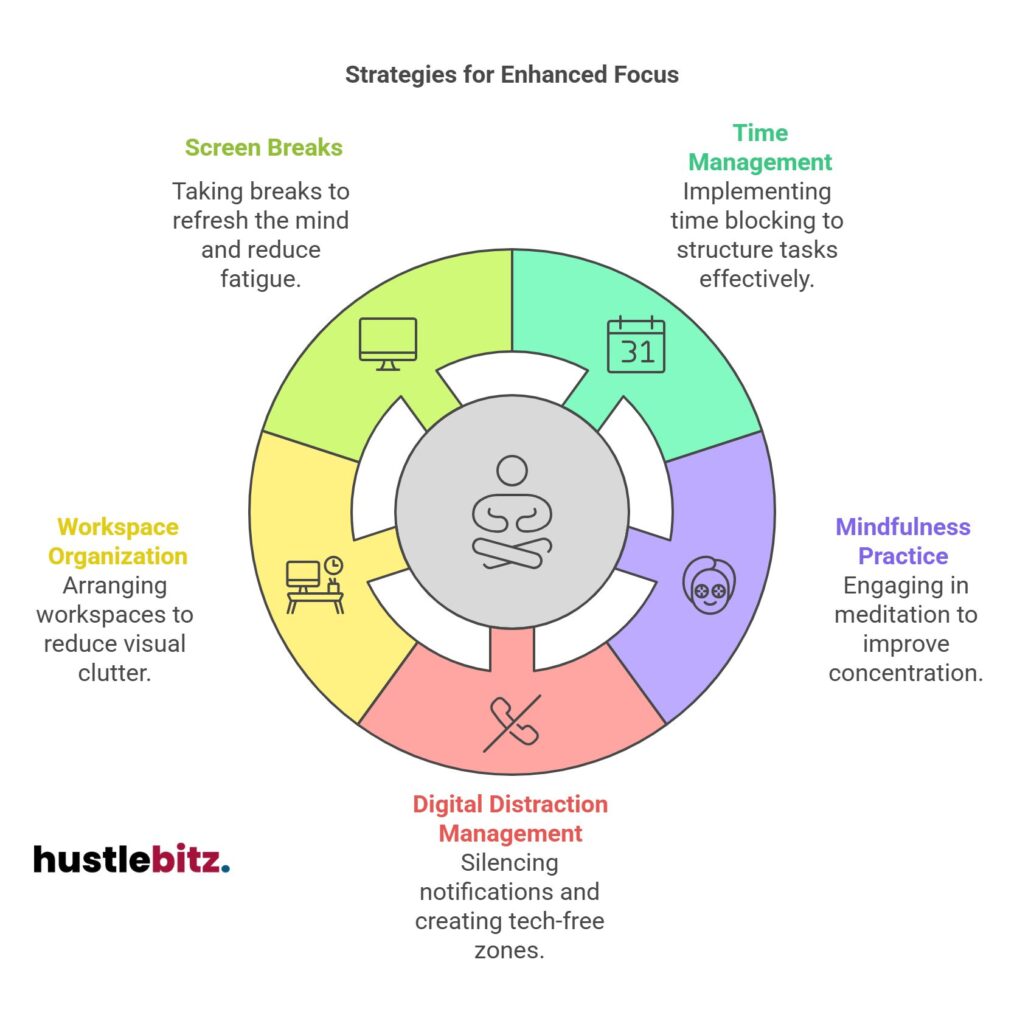Distraction management techniques are crucial for enhancing focus and productivity. By identifying and minimizing distractions from digital devices, environmental factors, and emotional responses, individuals can improve concentration. Strategies like time blocking, goal setting, and mindfulness practices are effective at fostering a focused mindset. Additionally, creating an organized workspace and reducing screen time can significantly boost mental clarity. Implementing these techniques not only enhances task performance but also promotes well-being. Understanding how to effectively manage distractions can lead to remarkable improvements in focus and efficiency, making it essential to explore these methods further.
Key Takeaways
- Implement time management strategies like time blocking to allocate specific periods for focused tasks and minimize interruptions.
- Practice mindfulness through meditation to enhance present engagement and reduce the impact of distractions on concentration.
- Manage digital distractions by silencing non-essential notifications and establishing tech-free zones to promote clarity and focus.
- Organize your workspace to minimize visual distractions and incorporate natural lighting to boost mood and energy levels for better concentration.
- Take regular screen breaks to allow the brain to reset, reducing mental fatigue and improving long-term focus and productivity.

Understanding Distractions

Understanding distractions is essential, as they can significantly impede our ability to concentrate and perform tasks effectively. Distractions arise from various sources, including digital interruptions and environmental cues that compete for our attention. As our attention span diminishes, we often fall prey to cognitive overload, where the sheer volume of information saturates our capacity to process it meaningfully. This can lead to mental fatigue and hinder our overall productivity.
The interplay between sensory processing and distractions is crucial. Our brains are wired to respond to emotional triggers, which can cause us to shift focus rapidly, a phenomenon known as task switching. Each switch not only consumes cognitive resources but also introduces delays in task completion, exacerbating feelings of frustration and overwhelm. The constant barrage of notifications and alerts from digital devices heightens this challenge, creating an environment where sustained focus becomes increasingly elusive.
Mindfulness practices can serve as effective countermeasures against these distractions. By fostering awareness of the present moment, individuals can develop strategies to manage their responses to distractions consciously. This proactive approach helps mitigate the effects of information saturation and enhances cognitive resilience.
Ultimately, recognizing the multifaceted nature of distractions enables us to implement more effective distraction management techniques, paving the way for improved focus and productivity in our daily lives. By taking control of our attention, we can create a more conducive environment for achieving our goals.
The Importance of Focus

Focus is a critical cognitive skill that enables individuals to concentrate their mental resources on specific tasks, thereby enhancing productivity and overall performance. Achieving mental clarity is essential for maximizing cognitive performance and enabling effective task prioritization. When individuals can focus, they can better assess their goals and allocate their time management strategies accordingly.
Mindfulness practices play a significant role in strengthening focus. By fostering emotional regulation and reducing stress, these practices empower individuals to maintain their attention on the tasks at hand. When stress levels are lowered, energy levels can increase, creating an optimal environment for self-discipline and sustained concentration.
Additionally, goal setting is integral to maintaining focus. Clear, achievable objectives provide a roadmap that guides individuals through their tasks, helping them prioritize activities that align with their long-term aspirations. This structured approach not only enhances productivity but also reinforces the importance of self-discipline in managing distractions.
Ultimately, the importance of focus cannot be overstated. It serves as the foundation for effective time management, emotional stability, and overall well-being. By prioritizing focus, individuals can cultivate a mindset conducive to success, ensuring that they harness their full potential in both personal and professional endeavors.
As distractions proliferate in today’s fast-paced world, honing the skill of focus is vital for sustaining high performance and achieving meaningful outcomes.
Identifying Your Distractions
Identifying your distractions is a crucial step in enhancing productivity and creating an environment conducive to sustained attention and effective task completion. Distractions can take many forms, ranging from external stimuli to internal thought processes. By recognizing these distraction triggers, individuals can cultivate personal awareness and reduce the mental clutter that often hampers focus.
To assist in this identification process, consider the following common distractions:
- Environmental cues: Sounds, visual distractions, and cluttered spaces can divert attention.
- Emotional responses: Stress or anxiety can lead to task switching or procrastination patterns.
- Sensory overload: Excessive stimuli can overwhelm the senses and diminish attention span.
- Digital interruptions: Notifications from devices can disrupt concentration and promote frequent task switching.
- Unstructured time: Lack of defined goals can lead to aimless wandering of the mind.
Effective Distraction Management Techniques
Once distractions have been recognized, implementing effective management techniques becomes vital for maintaining productivity and enhancing concentration. One powerful method is time blocking, which involves scheduling specific blocks of time for tasks. This technique promotes task prioritization, allowing individuals to focus on high-impact activities while minimizing interruptions.
Incorporating mindfulness practices can significantly improve focus. Techniques such as meditation and breathing exercises foster a state of awareness that helps individuals remain present in their tasks. Regular practice enhances resilience against distractions, facilitating a deeper engagement with work.
Engaging in a digital detox—periodically disconnecting from devices—can also be beneficial. Limiting screen time reduces the likelihood of digital distractions, enabling a clearer mindset. Coupled with goal setting, this approach helps individuals define clear objectives, providing motivation and direction.
Additionally, positive affirmations can reinforce a focused mentality. By affirming one’s capacity to concentrate, individuals cultivate a more productive mindset. Implementing organizational skills is equally important; keeping a tidy workspace and structured to-do lists can minimize visual distractions.
The Role of Environment in Enhancing Focus

An individual’s environment plays a crucial role in shaping their ability to concentrate and maintain productivity. Research indicates that optimizing one’s workspace can significantly enhance focus. Various elements within an environment contribute to this effect, and understanding them can lead to improved performance.
Workspace organization: A tidy workspace minimizes visual distractions, enabling clearer cognitive function.
Natural lighting: Exposure to daylight can boost mood and energy levels, making it easier to concentrate.
Color psychology: Different colors evoke varying emotional responses; for example, blue is often associated with calmness and focus.
Digital decluttering: Reducing the chaos of digital devices creates a more serene environment, allowing for better concentration.
Plant integration: Incorporating plants can provide sensory stimulation, improving air quality and creating a more inviting atmosphere.
Moreover, ambient noise can either hinder or enhance focus, depending on its nature.
For instance, soft background sounds may foster concentration, while jarring noises can lead to distractions.
Personal comfort is also vital; an ergonomic chair or an adjustable desk can promote well-being during extended work periods.
Reducing Screen Time for Better Concentration

Reducing screen time is essential for enhancing concentration, as excessive exposure to digital devices can lead to cognitive fatigue and diminished focus. Implementing a screen detox, which involves intentionally stepping away from screens for designated periods, can significantly improve mental clarity and productivity.
Establishing digital boundaries is crucial; this can be achieved by designating tech-free zones within the home, where screens are not permitted. This fosters an environment conducive to focused work or relaxation.
Mindful breaks are another effective strategy. Taking short, intentional pauses away from screens allows the brain to reset and recharge. This practice can be complemented by social media moderation, where individuals consciously limit their time on platforms that can be distracting.
Notification management is also vital; silencing non-essential alerts minimizes interruptions and helps maintain concentration. Additionally, setting gaming limits and app restrictions can prevent excessive engagement with digital entertainment, further supporting sustained focus on important tasks.
Family agreements regarding screen use can create a supportive atmosphere for all members, encouraging shared practices that prioritize concentration. Lastly, consider investing in focus-friendly devices that enhance productivity without the distractions of traditional smartphones or tablets.
Final Thoughts
Effectively managing distractions is key to unlocking your full potential for focus and productivity. By implementing techniques like time blocking, mindfulness practices, and reducing screen time, you can create a more conducive environment for concentration. Additionally, understanding the role of your environment in shaping your ability to focus allows you to make intentional adjustments that support your goals. Remember, the journey to enhanced focus is ongoing, and consistently applying these strategies will help you achieve greater clarity and efficiency in your daily tasks. By prioritizing distraction management, you set the stage for sustained success and well-being in both your personal and professional life.




